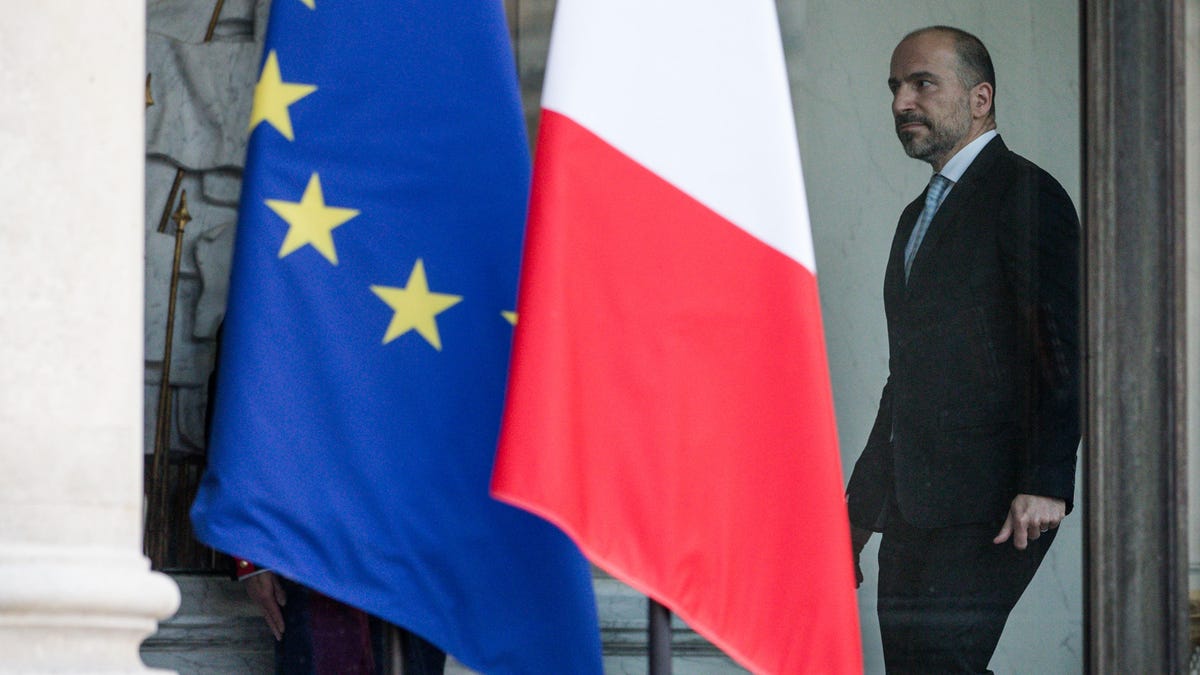Uber's CEO is on major charm offensive in Europe
Move over, Zuck. Dara Khosrowshahi's out to show how Uber really has changed.

Dara Khosrowshahi at the Elysee Palace after a meeting with the French president.
Mark Zuckerberg isn't the only Silicon Valley CEO touring this Europe this week hoping to make a positive impression.
Hot on his heels is the chief executive of Uber , Dara Khosrowshahi.
On Wednesday, Khosrowshahi met with French President Emmanuel Macron to discuss Uber's commitment to the country. The same day, he announced AXA insurance for all drivers across the continent. On Thursday, he appeared on stage at VivaTech in Paris, just hours after announcing a $23.5 million investment in the city to build a hub for developing flying taxis.
"Paris is the first city we expanded to when we went international," said Khosrowshahi, speaking at the show. "We want to be here, we want to build a business with France and for France."
When it first arrived in Europe, Uber's tactic was to land in cities and impose its business model cookie cutter-style, local regulations be damned. This resulted in the company's services being banned in many cities. But after years of being subject to Uber's divide-and-conquer strategy, change is in the air as Europe feels the full force of Khosrowshahi's charm offensive
Khosrowshahi has now been at Uber for nine months, but it's been a stretch in which scandal and regulatory issues left over from the past continued to rear up even as he's worked to implement change. Not that it seems to have fazed him.
"This was a company that was in trouble, had lost its way in certain ways, and I thought I could make a difference," he said. "I haven't looked back for a minute."
Arriving at the company, Khosrowshahi focused on three areas to overhaul, he said: governance, people and culture, and strategy.
"When I came in, the board of the company was very divided," he said. He set to about to reunite the board members so that Uber could move forward.
The next step was to rewrite the Uber rulebook. "We went out and actually crowdsourced the new values and cultures," he said. Thousands of Uber employees submitted ideas, and a set of cultural values were drawn up.
Finally, he broadened Uber's mission to tackle mobility — and particularly urban mobility — more widely. "What's different about the Uber strategy going forward is we're no longer just about cars."
Khosrowshahi still has work to do. For instance, Uber is appealing the loss of its license to operate in London. Last October, the CEO flew out to the UK to talk with regulator Transport for London the week following its decision. He's still waiting to hear the outcome.
On Thursday, he maintained that Uber's approach to dealing with cities has changed. "It has to be a partnership strategy," he said.
CNET Magazine: Check out a sample of the stories in CNET's newsstand edition.
'Hello, humans': Google's Duplex could make Assistant the most lifelike AI yet.

